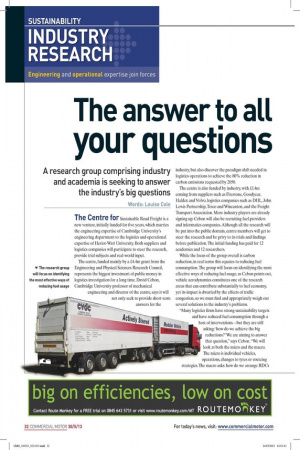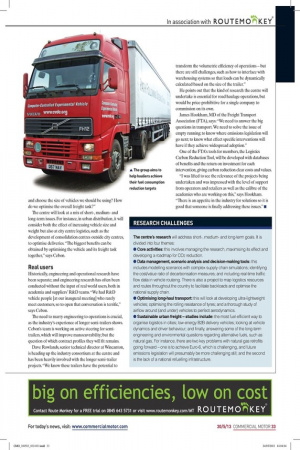The answer to all your questions A research group comprising
Page 23

Page 24

If you've noticed an error in this article please click here to report it so we can fix it.
industry and academia is seeking to answer the industry's big questions •• Lia; i-vulSe Cole The Centre for Sustainable Road Freight is a new venture, initially funded for five years, which marries the engineering expertise of Cambridge University's engineering department to the logistics and operational expertise of Heriot-Watt University. Both suppliers and logistics companies will participate to steer the research, provide trial subjects and real-world input.
The centre, funded mainly by a £4.4m grant from the Engineering and Physical Sciences Research Council, represents the biggest investment of public money in logistics investigation for a long time. David Cebon, Cambridge University professor of mechanical engineering and director of the centre, says it will not only seek to provide short-term answers for the industry, but also discover the paradigm shift needed in logistics operations to achieve the 80% reduction in carbon emissions requested by 2050.
The centre is also funded by industry, with £1.4m coming from suppliers such as Firestone, Goodyear, Haldex and Volvo, logistics companies such as DHL, John Lewis Partnership, Tesco and Wincanton, and the Freight Transport Association. More industry players are already signing up. Cebon will also be recruiting fuel providers and informatics companies. Although all the research will be put into the public domain, centre members will get to steer the research and be privy to its trials and findings before publication. The initial funding has paid for 12 academics and 12 researchers.
While the focus of the group overall is carbon reduction, in real terms this equates to reducing fuel consumption. The group will focus on identifying the most effective ways of reducing fuel usage; as Cebon points out, vehicle aerodynamics constitutes one of the research areas that can contribute substantially to fuel economy, yet its impact is dwarfed by the effects of traffic congestion, so we must find and appropriately weigh out several solutions to the industry's problems.
"Many logistics firms have strong sustainability targets and have reduced fuel consumption through a host of interventions but they are still asking: 'how do we achieve the big reductions?' We are aiming to answer that question," says Cebon. "We will look at both the micro and the macro. The micro is individual vehicles, operations, changes to tyres or routeing strategies. The macro asks: how do we arrange RDCs and choose the size of vehicles we should be using? How do we optimise the overall freight task?"
The centre will look at a mix of short-, mediumand long-term issues. For instance, in urban distribution, it will consider both the effect of increasing vehicle size and weight but also at city centre logistics, such as the development of consolidation centres outside city centres, to optimise deliveries. "The biggest benefits can be obtained by optimising the vehicle and its freight task together," says Cebon.
Real users Historically, engineering and operational research have been separate; and engineering research has often been conducted without the input of real world users, both in academia and suppliers' R&D teams. "We had R&D vehicle people [at our inaugural meeting] who rarely meet customers, so to open that conversation is terrific," says Cebon.
The need to marry engineering to operations is crucial, as the industry's experience of longer semi-trailers shows. Cebon's team is working on active steering for semitrailers, which will improve manoeuvrability; but the question of which contract profiles they will fit remains.
Dave Rowlands, senior technical director at Wincanton, is heading up the industry consortium at the centre and has been heavily involved with the longer semi-trailer projects. "We know these trailers have the potential to transform the volumetric efficiency of operations but there are still challenges, such as how to interface with warehousing systems so that loads can be dynamically calculated based on the size of the trailer."
He points out that the kind of research the centre will undertake is essential for road haulage operations, but would be price-prohibitive for a single company to commission on its own.
James Hookham, MD of the Freight Transport Association (FTA), says: "We need to answer the big questions in transport. We need to solve the issue of empty running; to know where emissions legislation will go next; to know what effect specific interventions will have if they achieve widespread adoption."
One of the FTA's tools for members, the Logistics Carbon Reduction Tool, will be developed with databases of benefits and the return on investment for each intervention, giving carbon reduction clear costs and values.
"I was lifted to see the relevance of the projects being undertaken and was impressed with the level of support from operators and retailers as well as the calibre of the academics who are working on this," says Hookham. "There is an appetite in the industry for solutions so it is good that someone is finally addressing these issues." • The centre's research will address short-, mediumand long-term goals. It is divided into four themes: • Core activities: this involves managing the research, maximising its effect and developing a roadmap for CO2 reduction.
• Data management, scenario analysis and decision-making tools: this includes modelling scenarios with complex supply chain simulations; identifying the cost/value ratio of decarbonisation measures; and including real-time traffic flow data in vehicle routeing. There is also a project to map logistics resources and routes throughout the country to facilitate backloads and optimise the national supply chain.
• Optimising long-haul transport: this will look at developing ultra-lightweight vehicles; optimising the rolling resistance of tyres; and a thorough study of airflow around (and under) vehicles to perfect aerodynamics.
• Sustainable urban freight studies include: the most fuel-efficient way to organise logistics in cities; low-energy B2B delivery vehicles; looking at vehicle dynamics and driver behaviour; and finally, answering some of the long-term engineering and environmental questions regarding alternative fuels, such as natural gas. For instance, there are two key problems with natural gas retrofits going forward one is to achieve Euro-6, which is challenging, and future emissions legislation will presumably be more challenging still; and the second is the lack of a national refuelling infrastructure.







































